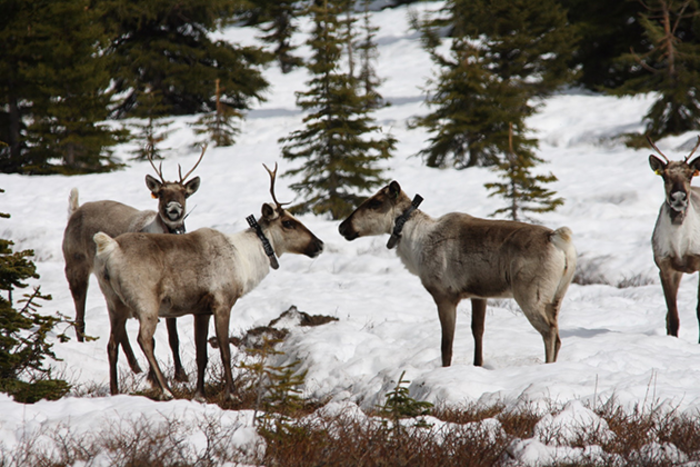Climbing caribou numbers in northeastern British Columbia prove that collaborations between Indigenous and colonial governments can reverse decades-long declines, but focus needs to shift to culturally meaningful recovery targets, a consortium of researchers and community members say in a new paper published this week in Science.

Credit: Line Giguere, Wildlife Infometrics.
Climbing caribou numbers in northeastern British Columbia prove that collaborations between Indigenous and colonial governments can reverse decades-long declines, but focus needs to shift to culturally meaningful recovery targets, a consortium of researchers and community members say in a new paper published this week in Science.
UBC Okanagan’s Dr. Clayton Lamb and West Moberly First Nation Chief Roland Willson co-lead the paper, Braiding Indigenous Rights and Endangered Species Law, alongside nine others for the influential journal.
“Abundance matters. There are many cases where endangered species laws have prevented extinction, but the warning signs of decline can appear long before the laws take effect. People who live and work on the land see these changes – we need to listen and act with them to prevent declines,” says Lamb, a biologist and MITACS postdoc in UBCO’s Irving K. Barber Faculty of Science. “There is a large gap between what the laws see as species recovery and what communities need for health, food security, and cultural well-being.”
The policy paper builds on collaborations between UBCO’s Lamb and Dr. Adam Ford, who have previously published research highlighting recovery efforts of the Klinse-Za caribou herd near the West Moberly and Saulteau First Nations. They also looked at evolving bison and salmon recovery efforts in North America.
Researchers heard stories from West Moberly Elders about a “sea of caribou” once looking like “bugs on the landscape,” but only 38 animals remained in 2013. Those numbers climbed to 115 a decade later thanks to interventions led by Indigenous groups. While these early signs of recovery are cause for immense celebration, the herd remains much smaller than historic levels.
“We need to move past a life support mentality for biodiversity,” says Ford, head of UBCO’s Wildlife Restoration Ecology Lab. “We must restore nature and the time-honoured ways people interact with the land.”
Canada and the United States have endangered species laws that are designed to recover species abundance to levels that will minimize the chance of extinction, but these recovery targets do not take into account culturally meaningful abundance or distributions of plants and animals, the authors say.
The paper highlights the current caribou count would only provide about three animals, or one meal per person, per year for Saulteau and West Moberly First Nations. The culturally significant count would require a herd of over 3,000 animals, an abundance more reflective of the historic “sea of caribou” level.
Naomi Owens-Beek, manager of Treaty Rights and Environmental Protection for Saulteau First Nation, contributed to the research and the policy paper.
She says the collaboration between Canadian and Indigenous leaders is essential to preserving traditional ways of life. Some Elders in the region have never tasted caribou, yet it was a staple of their ancestors and provided vital nutrition, material, spirituality, and a sense of place.
“We looked out at the land and thought, ‘What do these caribou need to be once again the great herds our Elders spoke about?’ We first reduced predation to make sure the caribou weren’t lost. Now we’re focusing on protecting and restoring habitat,” she says.
“Caribou habitat has long been mistreated, and now there’s so few caribou. These herds need space to thrive, and that’s why we’re working with the nations, the province of British Columbia and Canada, to heal these lands and increase the population so we can one day go back into the mountains and hunt caribou.”
The paper also examined efforts to restore salmon and bison habitat in North America. Chief Willson says each species shows modest signs of recovery, but that isn’t nearly the progress needed.
“Braiding Indigenous rights with laws protecting endangered species can enable nations to respect and safeguard the rights of Indigenous communities, curb the threat of species loss, and ultimately confer broad societal advantages,” he says.
Lamb, Willson, Ford and Owens-Beek were joined by Allyson Menzies (School of Environmental Sciences, University of Guelph), Michael Price (Earth to Ocean Research Group, Department of Biological Sciences, Simon Fraser University), Scott McNay (Wildlife Infometrics), Sarah Otto (Department of Zoology & Biodiversity Research Centre at UBC), Mateen Hessami (Wildlife Science Center—Biodiversity Pathways at UBCO), Jesse Popp (School of Environmental Sciences, University of Guelph) and Mark Hebblewhite (Wildlife Biology Program, University of Montana).
Permalink: https://news.ok.ubc.ca/2023/05/18/call-for-canada-to-braid-indigenous-rights-with-endangered-species-law/
Journal
Science
DOI
10.1126/science.adg9830
Method of Research
Commentary/editorial
Article Title
Braiding Indigenous rights and endangered species law
Article Publication Date
18-May-2023




